2016七年级英语下册Unit4Don’teatinclass句型透视(新版)人教新目标版
七年级英语下册Unit4Donx27teatinclass知识点总结
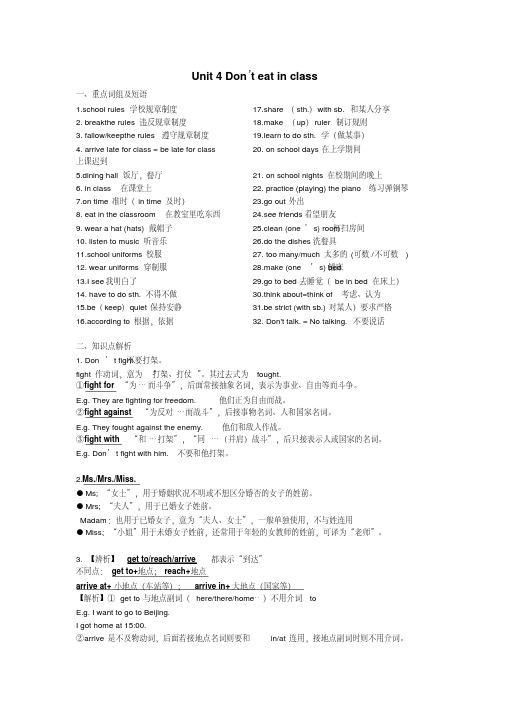
Unit 4 Don’t eat in class一、重点词组及短语1.school rules 学校规章制度17.share (sth.)with sb. 和某人分享2. breakthe rules 违反规章制度18.make (up)ruler 制订规则3. fallow/keepthe rules 遵守规章制度19.learn to do sth. 学(做某事)4. arrive late for class = be late for class20. on school days在上学期间上课迟到5.dining hall饭厅,餐厅21. on school nights在校期间的晚上6. in class 在课堂上22. practice (playing) the piano 练习弹钢琴7.on time准时(in time及时)23.go out外出8. eat in the classroom 在教室里吃东西24.see friends看望朋友9. wear a hat (hats) 戴帽子25.clean (one’s) room打扫房间10. listen to music听音乐26.do the dishes洗餐具11.school uniforms校服27. too many/much太多的(可数/不可数)铺床12. wear uniforms穿制服28.make (one’s) bed13.I see我明白了29.go to bed去睡觉(be in bed 在床上)14. have to do sth. 不得不做30.think about=think of 考虑、认为15.be(keep)quiet保持安静31.be strict (with sb.)对某人)要求严格16.according to根据,依据32. Don't talk. = No talking.不要说话二、知识点解析1. Don’t fight.不要打架。
七年级英语下册第四单元重点短语及句型汇总

七年级英语下册第四单元重点短语及句型汇总七年级英语下册第四单元重点短语及句型汇总七年级英语下册第四单元重点短语及句型汇总Unit4Don’teatinclass知识点一.重点短语1.schoolrules学校规章制度2.break(fallow/keep)therules违反(遵守)规章制度3.arrivelateforclass=belateforclass上课迟到4.dininghall饭厅,餐厅5.inclass在课堂上6.ontime准时(intime及时)7.listentomusic听音乐8.wearschooluniforms穿校服9.Isee我明白了10.be(keep)quiet保持安静11.accordingto根据,依据12.make(up)ruler制订规则13.share(sth.)withsb.和某人分享(…)14.onschooldays在上学期间15.onschoolnights在校期间的晚上16.practice(playing)thepiano练习弹钢琴p racticedoing…练习做…]17.goout外出18.clean(one’s)room打扫房间19.dothedishes洗餐具20.toomany/much太多的(可数/不可数)21.gotobed去睡觉(beinbed在床上)22.bestrict(withsb.)对某人要求严格23.Don’ttalk.=Notalking.不要说话24.followrules遵守规则二.用法集萃1.Don’t+动词原形+其他,不要做某事。
2.helpsb.(to)dosth.帮助某人做某事3.toomany+可数名词复数太多的……4.toomuch+不可数名词太多的5.practicedoingsth.练习做某事6.bestrictwithsb.对某人要求严格7.bestrictinsth.对某事要要求严格8.keep+宾语+形容词使……保持某种状态9.learntodosth.学会做某事10.havetodosth.不得不做某事11.leavesthsp.把某物忘在某地三.重点句型1.Don’tarrivelateforclass.Youmustbeontime.上课不要迟到。
七年级英语下册Unit4Don’teatinclass单词短语及重点句型新版人教新目标版_297

Unit 4 重点短语及句型背诵(留存备用考前复习)Key Phrases重点短语1.in class 在课堂上2.be/arrive late for 迟到3.in the hallways 在走廊里4.in the classroom 在教室里5.listen to (music) 听(音乐)6.in the dining hall 在餐厅里7.be on time 准时 8.a lot of rules 许多规则9.some of... 一些...... 10.bring...to... 把.....带来....11.have to 不得不 12.keep/be quiet 保持安静13.wear the school uniform 穿校服 14.wear a hat 戴帽子15.go out 外出(娱乐) 16.do the dishes 清洗餐具17.on school nights/days 在上学日的晚上/在上学日18.every morning 每天早上 19.too many rules 太多规则20.make(one's) bed 铺床 21.think about 考虑22.be strict(with sb.) (对某人)要求严格 23.follow the rules 遵守规则Key Sentences 重点句型1.Don't be/arrive late for class. You must be on time.上课不要迟到。
你必须按时到。
2.It's my first day at school.这是我在学校的第一天。
3.What are some of the rules? 其中的一些规则是什么呢?4.Can we bring music players to school? 我们可以把音乐播放器带到学校来吗?5.And we always have to wear the school uniform.我们总是得穿校服。
七年级英语下册《Unit4Don'teatinclass》教案8(新版)人教新目标版
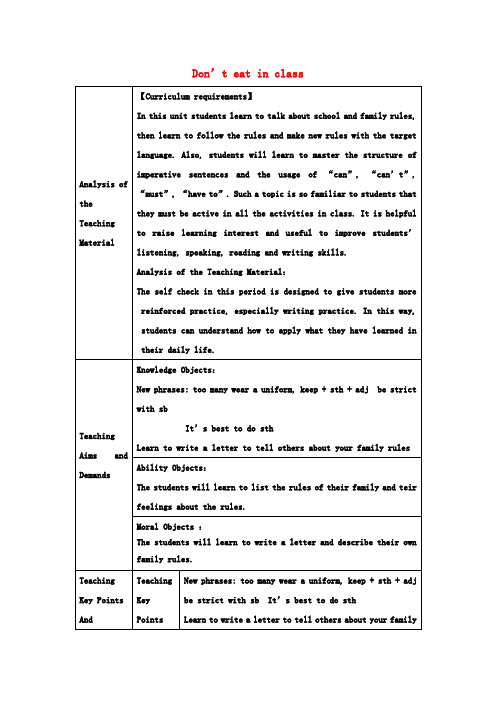
Blackboard Design
Mary
StepⅢlearn to write their own letters.
StepⅣSummary
T: Molly is very unhappy. He wants to write a letter to Dr Know about the rules in his house. Imagine you are Molly, do it!
Things you have to do things you can’t do
e the things you list to make sentences.
plete3aand read Zhaopei’s letter, then choose out the important sentences we will use.
Teaching Key Points
And Teaching Difficult Points
Teaching Key Points
New phrases: too many wear a uniform, keep + sth + adj be strict with sb It’s best to do sth
Dear,
Can you help me? I’m not happy because there are too many rules at home. Every morning, I have to
. after school, I can’t.because
. I can’ton weekends because I. I never have fun. What can I do?
初中英语《Unit4Don’teatinclass》单元教学设计以及思维导图

Unit 4 Don’t eat in class适用年级七年级所需时间课内共用4课时主题单元学习概述本主题单元的标题是“Don’teat in class.”,是人教版七年级下册第四单元,内容与学生学校生活相关,符合七年级学生的年龄特点和心理特点,他们有深刻的生活体验,易于接受。
本单元的中心话题是rules,主要语言功能项目是谈论并制定某些规章制度(校规、班规、家规等)。
语言结构为祈使句,情态动词can 表示许可的用法和情态动词must,have to以及各种句式的变化。
围绕这一中心话题,结合学生生活实际,教材插入了许多学生感兴趣的图片,从基本语言知识到语言综合运用层层递进,听、说、读、写依次展开,引导学生思考、学习和运用语言,并寓教于学,对学生起到规范教育作用。
谈论规章制度这个话题在英语中表现出较强的语体差异——书面语及口语、正式及非正式场合中语言的使用不完全相同。
具体说,书面语及命令式的正式口语中人们多使用祈使句,而大多数口语交流中,人们则有意回避祈使句结构,较多地使用相应的情态动词。
这一点,英语和汉语的语言文化有很大差异。
英语语言中,不合时宜或生硬地使用祈使句,即便不被视为没有礼貌或缺乏教养,也回被认为不够友善。
因此通过这单元的学习,学生还将学会如何得体地使用祈使句和情态动词来谈论规章制度。
本单元的学习重、难点:重点掌握祈使语气的用法,包括表示允许的Can及其当情态动词用的haveto do;以及各种可以用在表述规章制度的动词和句型。
难点在于情态动词的用法,以及祈使句与它的应答。
依据语言学习“感知、体会、理解、运用”的认知规律,将本单元的学习划分为两个专题。
专题一:学会得体地使用祈使句和情态动词来谈论学校规章制度。
专题二:如何运用所学与他人谈论其他规章制度,如家规,公共场合的规章制度等。
专题三是研究性学习专题,在以上两个专题学习的基础上,了解中外相同或不同的校规、班规及家规,了解西方孩子有烦恼时,更愿意向专业人士或机构求助。
七年级英语下册Unit4Don’teatinclass要点详解素材3新版人教新目标版
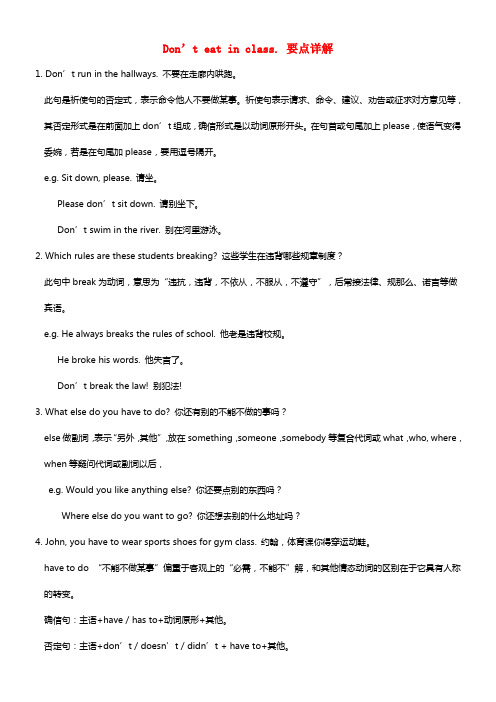
Don’t eat in class. 要点详解1. Don’t run in the hallways. 不要在走廊内哄跑。
此句是祈使句的否定式,表示命令他人不要做某事。
祈使句表示请求、命令、建议、劝告或征求对方意见等,其否定形式是在前面加上don’t组成,确信形式是以动词原形开头。
在句首或句尾加上please,使语气变得委婉,若是在句尾加please,要用逗号隔开。
e.g. Sit down, please. 请坐。
Please don’t sit down. 请别坐下。
Don’t swim in the river. 别在河里游泳。
2. Which rules are these students breaking? 这些学生在违背哪些规章制度?此句中break为动词,意思为“违抗,违背,不依从,不服从,不遵守”,后常接法律、规那么、诺言等做宾语。
e.g. He always breaks the rules of school. 他老是违背校规。
He broke his words. 他失言了。
Don’t break the law! 别犯法!3. What else do you have to do? 你还有别的不能不做的事吗?else做副词,表示“另外,其他”,放在something,someone,somebody等复合代词或what,who, where,when等疑问代词或副词以后,e.g. Would you like anything else? 你还要点别的东西吗?Where else do you want to go? 你还想去别的什么地址吗?4. John, you have to wear sports shoes for gym class. 约翰,体育课你得穿运动鞋。
have to do “不能不做某事”偏重于客观上的“必需,不能不”解,和其他情态动词的区别在于它具有人称的转变。
七年级英语下册Unit4Don’teatinclass短语、语法知识点汇总(新版)人教新目标版
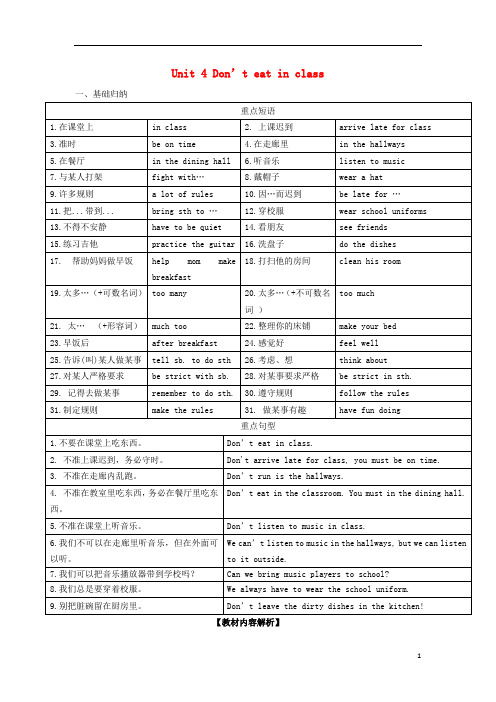
Unit 4 Don’t eat in class 一、基础归纳【教材内容解析】Section A1.Don’t arrive late for class. (P. 19)arrive作不及物动词,表示“到达”,接宾语时,需要加上介词in或者at。
When did you arrive?We are arriving at the station at two o’clock.【拓展】reach表示“到达”时,是及物动词,后面直接接表示地点的名词作宾语。
另外两个表示“到达”的动词(get和arrive)都是不及物动词,get to+地点;arrive in/at+地点。
After a long way, they reached/got to/arrived at the top of the mountain finally.2.You must be on time. (P. 19)on time用作固定短语,表示“准时、按时”,in time表示“及时”。
The train arrives on time.The ambulance(救护车) arrives in time.3.Don’t listen to music in class. (P. 19)listen用作不及物动词,表示听的动作,后接宾语时,需要加上介词to,hear强调听的结果,表示“听到”。
This girl likes to listen to music.Can you hear anything?4.Don’t fight. (P. 19)fight此处用作动词,意为“打架”,fight with sb.意为“与某人打架”。
Why do you sometimes fight with others?5.listen to music outside (P. 20)outside表示“在外边”,反义词为inside“在……里面”。
七年级英语下册Unit4Don’teatinclass语法攻关素材新版人教新目标版
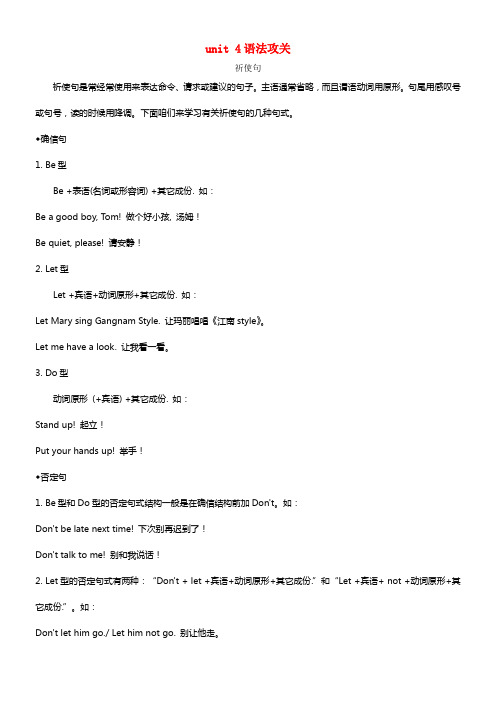
unit 4语法攻关祈使句祈使句是常经常使用来表达命令、请求或建议的句子。
主语通常省略,而且谓语动词用原形。
句尾用感叹号或句号,读的时候用降调。
下面咱们来学习有关祈使句的几种句式。
◆确信句1. Be型Be +表语(名词或形容词) +其它成份. 如:Be a good boy, T om! 做个好小孩, 汤姆!Be quiet, please! 请安静!2. Let型Let +宾语+动词原形+其它成份. 如:Let Mary sing Gangnam Style. 让玛丽唱唱《江南style》。
Let me have a look. 让我看一看。
3. Do型动词原形(+宾语) +其它成份. 如:Stand up! 起立!Put your hands up! 举手!◆否定句1. Be型和Do型的否定句式结构一般是在确信结构前加Don't。
如:Don't be late next time! 下次别再迟到了!Don't talk to me! 别和我说话!2. Let型的否定句式有两种:“Don't + let +宾语+动词原形+其它成份.”和“Let +宾语+ not +动词原形+其它成份.”。
如:Don't let him go./ Let him not go. 别让他走。
3. 以No开头,后面跟动词-ing形式,用来表示禁止。
如:No parking! 禁止停车!No smoking! 禁止抽烟!No swimming! 禁止游泳!◆祈使句和其他句子连用,常见的结构有:1. “祈使句+ and +简单句”表示“……就……”,如:Take a shower, and you'll be relaxed. 洗个澡,你就能够放松。
2. “祈使句+ or +简单句”表示“……不然……”,如:Be careful, or you'll get hurt.警惕点,不然你会受伤的。
Unit4Don’teatinclass 语法精讲精练课件人教版英语七年级下册

(3)A: Let’s go out for a walk. (用“Let’s do sth.”时,常用于提出意见) B: That’s a good idea./ That sounds good. (赞同)
Oh, no. it’s too hot./ Oh, no. Let’s watch TV at home. (否定回答,并适当解释或提出自己的见解)
肯定回答常用“Yes, I will.”表示“将要”, 否定回答(No,I won’t)表示“将不,将不会。”
4
(1)A: Tom, take the box to Mr. Wu’s office. B: Yes, I will. /(好的, 我会做的。) Sorry, I can’t carry it. (对不起,我搬不动它。)
Unit 4 Don’t eat in class.
单元语法精讲精练
1
祈使句的运用
1. 定义: 表示请求、命令、警告、建议等的句子。在祈 使句中,一般以动词原形开头, 通常省略主语you, 句 末可以用感叹号或句号。也可以在句前或句末加上 please,以使语气更加缓和、客气。 如: Please come in. ( =Come in, please.) 请进
2
2. 祈使句的句式结构:
句式结构 P型:Please+动词原形+其他 V 型:动词原形+其他 L型:Let +宾语+动词原形+其他
B 型:Be+表语
N型:No+名词/动名词
肯定式 Please stand up. Sit down./ Stand up. Let me help you.
Be carful! Be a good boy. \
- 1、下载文档前请自行甄别文档内容的完整性,平台不提供额外的编辑、内容补充、找答案等附加服务。
- 2、"仅部分预览"的文档,不可在线预览部分如存在完整性等问题,可反馈申请退款(可完整预览的文档不适用该条件!)。
- 3、如文档侵犯您的权益,请联系客服反馈,我们会尽快为您处理(人工客服工作时间:9:00-18:30)。
Unit 4 Don’t eat in class一)No talking . 禁止说话!用于省略结构,表示“不要,禁止”后加名词或动名词。
(相当于否定的祈使句)No photos 请勿拍照No smoking = Don’t smoke .No parking = Don’t park.二)祈使句的用法1. 肯定结构:1)主语为第二人称的祈使句Be a polite boy, Tom.Open the door please.2)主语为除第二人称以外的祈使句:Let + 第一、第三人称代词或名词+动词原形Let’s go home .Let them go first.Let Mary do it.2. 否定结构1)含第二人称主语的祈使句的否定式前加Don’tDon’t run in the hallway.2)含第一、三人称主语的祈使句的否定式有两种:Let’s not +动词原形Let’s not say anything about it.Don’t let +第三人称代词或名词+动词原形Don’t let them play in the street.练一练1. _______( not stand) too close to the animals. It’s too dangerous.2. _______ late next time.A. Be notB. Don’t beC. Aren’tD. Not to be三)What else do you have to do ? We have to clean the classroom.你们还得做什么?我们还得打扫教室。
1. else 其他的,只修饰特殊疑问词和不定代词,且位于其后。
other 修饰名词,且置于其前。
Where else did you go last Sunday? 上星期日你去过其它地方吗?Nothing else, thank you. 不要别的了,谢谢。
What other animals do you like?2. have to 不得不有时态、人称和数的变化,指外部环境有要求,多表达客观要求。
must必须无时态、人称和数的变化,着重指说话人带有强烈的要求,多表达主动的意思,出于本人自觉。
I must do my homework now. 我现在必须做作业了。
(主动)I have to do my homework now. 我现在不得不做作业了。
(被动)I didn’t have to stay at home last night. 昨晚我不必呆在家里。
练一练1. It’s too late . I ______ leave now.A. mayB. canC. have toD. will2. Mr Smith ______ look after his son and daughter because his wife is ill.A. mustB. have toC. has toD. doesn’t have to3. She has to do her homework first. (否定句)She _____ ____ _____ do her homework.四)And you can’t watch TV after school. I can’t, either.too, also 用于肯定句中,too一般用于句末,also一般用于句中,位于实义动词前,be动词和助动词之后either 用于否定句,位于句尾I can speak English, he can speak English, too.I can speak English, he can also speak English.I can’t speak English, he can’t, either.五)情态动词have to 的用法:意思是"必须、不得不"侧重于客观上的必要和外界的权威。
●结构:主语+have to+动词原形+其他●一般现在时:主语是第三人称单数时用has to,其它时候用have to(过去时:无论人称和单复数都用had to.)Eg:We have to wear sneakers for gym class. 在体育课上Tom has to practice the guitar every day. 汤姆每天必须练习弹吉它。
(I had to get up at 5:00 am last Monday. 上周一我不得不早上5点起床。
)●否定形式:主语+don't have to+动词原形+●一般现在时:主语是第三人称单数时用doesn't have to,其它时候用don't have to.(过去时: 无论人称和单复数都用didn't have to)Eg:Nick doesn't have to wear a uniform. 尼克不必穿制服。
We didn't have to do our homework at once. 我们不必马上完成作业。
●疑问句:Do 、Does或Did+主语+have to +动词原形+其他Eg:---Do you have to stay at home on weekends? 周末你必须呆在家里吗---Yes, I do. / No, I don't. 是的Did he have to go to bed by 11:00 last night? 昨晚11点前上床睡觉吗?【典型例题】Lucy has to wear sports shoes for gym class.(该为否定句)Lucy ________ ________ to wear sports shoes for gym class.六).情态动词must的用法:must表示说话人的主观看法,及主观上的必要性,还用于命令或愿望。
只用于现在时,无人称和单数的变化。
在表示过去、将来和完成时,用have to的相应形式来代替must.●在表示有做某一个动作的必要和义务,它的意思是“必须,应该”。
Eg:You must finish your homework fist.你必须先完成作业。
●表示有很大把握的判断或者推测,意思是“一定,准是”。
Eg:The tall man must be your father.那个高个子男人一定是你的爸爸。
●以must开头的一般疑问句,它的否定回答用needn’t(不必要),不用mustn’t(不允许),mustn’t常用于否定句中表示“不允许,禁止”。
Eg:---Must I go there on foot?我必须得走过去吗?---No,you needn’t.不,你不需要。
You mustn’t park your car here.你的车不允许停在这儿。
【典型例题】It’s very warm outside.You ________wear the coat.A.have toB.hadn’tC.don’t have toD.mustn’t七).情态动词can的用法:●表示能力:"会""能"Eg:Can you play the guitar? 你会弹吉它吗Judy can speak a little Chinese. 朱蒂会说一点中文。
I can dance and sing. 我能唱歌又能跳舞。
●表示允许、许可:"可以"、"能"Eg:Can the students run in the hallways? 学生们可以在走廊上跑吗We can eat outside. 我们可以在外面吃东西。
Can I come in? 我能进来吗●注意:同样是情态动词can 和have to 的用法是有区别的,和大部分情态动词一样,can 在否定句中直接在can后加上not;在疑问句中把can放到主语前面,并且没有人称和数的变化,而 have to 是有相应变化的,详情请参照上一条。
【典型例题】The children ________play football on the road.A.canB.mustC.mustn’tD.may---Must I clean the blackboard?---No,you ________.A.needn’tB.mustn’tC.can’tD.may notYour mother ________there,she has gone to America.A.must beB.could beC.may beD.can’t be八). 祈使句(Imperative Sentence)●定义:用于表达命令、请求、劝告、警告、禁止等的句子叫做祈使句,祈使句最常用于表达命令,因此在学校文法中也常称为命令句。
●祈使句因对象(即主语)是第二人称,所以通常都省略。
祈使句的动词都为一般现在时,句末则使用句号或感叹号来表示结束。
●祈使句的肯定句:行为动词原形+其他Eg:Go and wash your hands.去洗你的手。
——命令Be quiet, please.= Please be quiet.请安静。
——请求Be kind to our sister.对姐妹要和善。
——劝告Watch your steps.走路小心。
——警告Look out!Danger!小心!危险!——强烈警告,已如感叹句Keep off the grass.勿践草坪。
——禁止No parking.禁止停车。
——禁止●以Let开头的祈使句,Let后宾语是是第一人称时,否定形式是在宾语后加not,Eg:Let’s not do that again.我们别再那样做了。
如果Let 后面宾语是第三人称,否定形式是在Let前加助动词Don’t,Eg:Don’t let them come in.别让他们进来。
●祈使句的否定通常使用“Don't …”,Don't+动词原形(行为动词/be动词)+其他Eg:Don't let the dog in.不要让那只狗进来。
Don't touch, please.请不要用手触摸。
Don't be silly.别傻了。
●祈使句有时也把主语“You”表达出来,使对方听起来觉得柔和些,例如:Eg:You go and tell him, Chris.克立斯你去告诉他。
